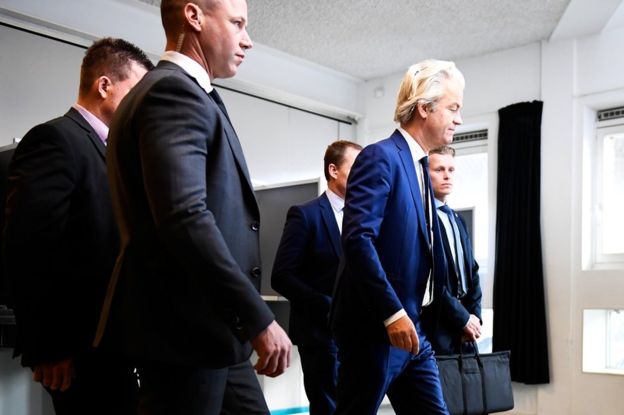Voters are going to the polls in the Netherlands in the first of three crucial eurozone elections this year.
The race is dominated by Prime Minister Mark Rutte’s centre-right party and that of Geert Wilders, running on an anti-immigration platform.
Mr Rutte has said the election is an opportunity for voters to “beat the wrong sort of populism”.
Mr Wilders has pledged to take the Netherlands out of the EU, close all mosques and ban the Koran.
His Freedom Party had been leading in opinion polls but they have since suggested his support may be slipping.
France goes to the polls next month to elect a new president while Germany is due to hold a general election in September.
Wednesday’s election also comes amid a diplomatic spat between the Netherlands and Turkey.
“Whatever the outcome of the elections today, the genie will not go back into the bottle and this patriotic revolution – whether today or tomorrow – will take place,” Mr Wilders declared after casting his vote.
While a populist surge is still possible in the Dutch ballot, a host of other parties could also do well, leaving Dutch politics fragmented, the BBC’s Damian Grammaticas reports from The Hague.
As parliamentary seats are allocated in exact proportion to a party’s vote share and no major party wants to be in a coalition with Mr Wilders, he has little chance of entering government however well he performs, our correspondent says.
How are the mainstream parties fighting back?
After casting his vote, Mr Rutte asked his fellow citizens to imagine how the world would react if the Freedom Party came first.
“I think the rest of the world will then see that after Brexit, after the American elections, again the wrong sort of populism has won the day,” he said.
Earlier, in televised debates, Mr Rutte and Mr Wilders clashed over how to stem immigration.
Mr Rutte dismissed Mr Wilders’s plan to close borders and mosques and to ban the Koran as “fake solutions”.
Mr Wilders accused Mr Rutte of providing better healthcare for immigrants than for the Dutch themselves.
Lodewijk Asscher of the Labour Party, the junior party in Mr Rutte’s coalition, called Mr Wilders a man of “10,000 angry tweets and no solutions”.
Who else is on the ballot paper?
Several of the smaller party leaders are being seen as potential power-brokers.
Seven of the 28 parties running could win more than 10 seats in the 150-seat parliament, the polls suggest.
Christian Democrat Sybrand Buma and liberal Alexander Pechtold might go into coalition in the event of a Rutte victory.
But other parties could end up as king-makers too, such as the Green-Left under Jesse Klaver and the Socialist party.
None are likely to take part in a coalition with Geert Wilders.
Where are all the women?
All of the parties forecast to win 10 seats or more are led by men yet women made up more than a third of MPs in the outgoing parliament (58 out of 150).
BBC
 Q FM Africa's Modern Radio
Q FM Africa's Modern Radio
